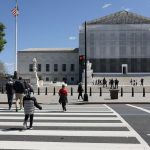
Edwin Clark, a distinguished Nigerian statesman, Ijaw leader, and political figure from Delta State, passed away on Monday, February 17, 2025, at the age of 97. The news of his death was confirmed on Tuesday, February 18, through a statement jointly issued by Olorogun Obiuwevbi Ominimini, the National Publicity Secretary and Spokesman of the Pan Niger Delta Forum (PANDEF); Professor College Clark of the Clark-Fuludu-Bakederemo family of Kiagbodo; and Ambassador Godknows Igali, the National Chairman of PANDEF. Early Life and Background Edwin Clark was born on May 25, 1935, in the then-British colonial Nigeria. As a man of the Ijaw ethnic group, one of the major communities in the Niger Delta, he grew up with firsthand knowledge of the struggles facing his people. The Niger Delta, rich in natural resources, especially oil, has been one of the most exploited regions of Nigeria, yet its people remain among the poorest in the country. Clark’s formal education and his background as a lawyer allowed him to ascend into positions where he could use his voice for advocacy, eventually becoming a strong political figure, particularly in the South-South region of Nigeria. The Fight for Resource Control Edwin Clark became a key advocate for resource control, a central issue for the people of the Niger Delta. The Niger Delta has long been the oil-producing heart of Nigeria, yet the region’s people have seen little to no benefit from the immense wealth generated by oil extraction. In the early stages of his activism, Clark was vocal in condemning the imbalances in revenue distribution between the federal government and the oil-producing states. While the federal government controlled nearly all the revenues generated from oil, states like Rivers, Bayelsa, Delta, and Akwa Ibom, which host oil fields, received only a small portion. Clark, alongside other Niger Delta leaders, sought to reform this system. His call for “resource control” was to ensure that states hosting the oil fields would have greater control over the resources extracted from their land, thereby improving the living conditions and infrastructural development of the region. His efforts found a strong ally in the late General Sani Abacha’s regime, where the concept of resource control became a rallying cry for many Southern leaders. Although the battle for resource control was long and difficult, it led to key constitutional debates in Nigeria. Clark was a major proponent of the agitation that would eventually lead to the creation of the Niger Delta Development Commission (NDDC) in 2000, an initiative aimed at addressing underdevelopment in the region. Despite the commission’s establishment, Clark continued to push for further reforms, arguing that it was not enough and that resource control remained the only just solution to the Niger Delta’s plight. Championing the Rights of Niger Delta People Edwin Clark’s fight wasn’t just about oil wealth—it was about the preservation of the rights and dignity of the people of the Niger Delta. He stood for the region’s right to govern itself, demand fair compensation for its environmental damage, and control its own resources. One of his significant contributions to this cause was his involvement in the Niger Delta People’s Congress (NDPC), which sought to protect the cultural, social, and economic rights of the people of the region. The environmental degradation in the Niger Delta due to decades of oil spills, gas flaring, and lack of meaningful investment in the region’s infrastructure prompted Clark to press for corporate responsibility from oil companies. He played a central role in holding multinational oil corporations like Shell and Chevron accountable for their actions, often accusing them of complicity in the environmental destruction of the region. Clark also spoke out against the Nigerian government’s heavy-handed approach to the region’s struggles, notably during the era of military dictatorship. His support for peaceful protests and his resistance against military suppression marked him as a prominent anti-authoritarian voice. He condemned the Nigerian government’s treatment of the region, arguing that the government often used military force to suppress Niger Delta communities rather than engage in genuine dialogue or development. The Battle for Autonomy and Local Governance Edwin Clark also played a significant role in advocating for political autonomy for the Niger Delta. He was a strong proponent of a federal system of governance that would empower local authorities in the South-South region, especially when it came to controlling their natural resources and managing their affairs. During Nigeria’s transition to democracy in the 1990s, Clark supported the creation of a South-South geopolitical zone to give the region a more significant voice in the Nigerian political sphere. His lobbying efforts helped ensure that the Niger Delta was not overlooked in the creation of the state’s structure in the country. He was instrumental in the political dynamics that brought the South-South region into greater focus at the national level. The Ogoni Nine and the Struggle for Environmental Justice Although the Ogoni people were the most prominent group in the Niger Delta’s environmental activism, Clark was a vocal ally in their battle for justice. The Ogoni Nine, a group of activists and leaders executed in 1995 by the Nigerian military government, symbolized the sacrifices made by Niger Delta activists fighting against environmental degradation and government oppression. Clark repeatedly called for accountability for the killings and the unfair treatment of Niger Delta activists. He worked to bring attention to the environmental damage caused by oil companies and the negligence of the Nigerian state in addressing these issues. His legal acumen and activism ensured that the Ogoni struggle remained on the national and international radar. Legacy and Ongoing Impact Edwin Clark’s contributions to the Niger Delta’s political and environmental struggles are immeasurable. He remains a prominent figure in Nigerian politics and an icon of the Niger Delta’s pursuit of justice. His influence has shaped the way the region is viewed both domestically and internationally. While resource control remains a contentious issue, Edwin Clark’s advocacy has had a lasting impact on Nigeria’s political landscape. His involvement in the formation of various political coalitions, including his

A Kano State High Court has issued a perpetual injunction restraining the Central Bank of Nigeria (CBN) from withholding funds allocated to the 44 local government areas (LGAs) in the state. The court ruling, delivered on Monday, February 17, comes after a motion was filed by the applicants, including the Chairman of the Nigeria Union of Local Government Employees (NULGE), Ibrahim Muhd, and others. The motion, filed on November 1, 2024, sought to prevent the respondents comprising the Accountant-General of the Federation (AGF), the Revenue Mobilisation Allocation and Fiscal Commission (RMAFC), the CBN, and several commercial banks from withholding or delaying monthly financial allocations meant for local governance in Kano State. The case follows a backdrop of delays in the direct transfer of monthly allocations to local governments, despite a Supreme Court ruling in July 2024 that granted financial autonomy to local government areas (LGAs) across Nigeria. This delay, which has hindered effective local governance, has caused concern in Kano, where officials argue that withholding these funds violates the constitutional rights of local residents. Justice Ibrahim Musa-Muhammad, who presided over the case, held that the applicants had successfully proven their case. In his judgment, he referenced the Supreme Court’s decision in Suit No SC/CV/343/2024 vs Attorney General of Abia State and 35 others, which mandates that the AGF, CBN, and RMAFC are required to disburse monthly allocations to democratically elected councils in line with the provisions of the 1999 Nigerian Constitution. The court ruled that any action that prevents or delays the transfer of these funds would constitute a breach of the fundamental rights of the people residing in the affected LGAs. The court further declared that withholding allocations would violate several sections of the Nigerian Constitution, particularly Sections 33, 42, 43, 44, 45, and 46, as well as Articles 13, 19, 22, and 24 of the African Charter on Human and Peoples’ Rights. Justice Musa-Muhammad reaffirmed that the CBN, AGF, and RMAFC are legally obligated to ensure that funds accruing to the Federation Account are properly distributed to the local governments. In his submission, the counsel for the applicants, Mr. Bashir Yusuf-Muhammad, argued that the respondents’ actions had caused significant hardship and were unlawful. He urged the court to dismiss the respondents’ counter affidavit and grant the reliefs sought by the applicants. Representing the 44 local governments, Ibrahim Isa-Wangida, holding brief for Senior Advocate of Nigeria (SAN) Eyitayo Fatogun, did not oppose the application, affirming that the timely disbursement of LG allocations was crucial for the smooth operation of local governance. The CBN, however, filed a notice of preliminary objection on November 14, 2024, challenging the court’s jurisdiction to entertain the case, and requested that the CBN be removed from the suit. Counsel for the commercial banks, including UBA, Keystone Bank, and Guarantee Trust Bank, similarly argued that their clients had no role in the disbursement process and requested that the court strike out their involvement in the case. Despite the objections, the court maintained its stance, siding with the applicants, and emphasised that the withholding of funds would not only harm local governments but also infringe on the rights of the citizens they serve. This ruling is seen as a significant victory for local governance in Nigeria, as it affirms the constitutional rights of local governments to receive their rightful allocations from the Federation Account. The ruling also places pressure on the relevant agencies, including the CBN, to ensure that financial autonomy for local governments is respected and implemented across the country.
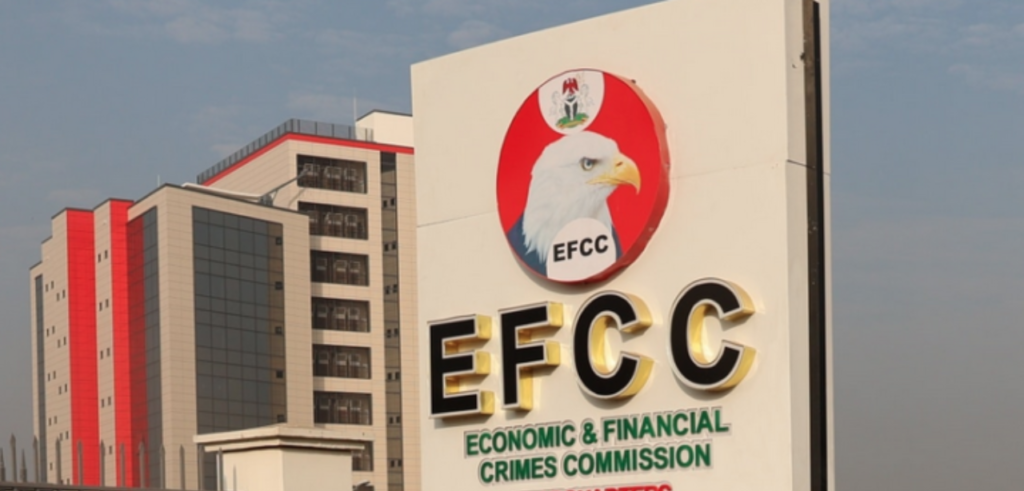
The Economic and Financial Crimes Commission (EFCC) and the Corporate Affairs Commission (CAC) have announced a deepened collaboration aimed at tackling corruption and promoting transparency in Nigeria’s business sector. In a statement released on Tuesday, February 18, in Abuja, the two agencies outlined their commitment to working together to curb fraudulent activities, ensure businesses operate with integrity, and create a more stable economic foundation for the country. This new phase of cooperation was disclosed following a courtesy visit by EFCC Executive Chairman, Olanipekun Olukoyede, to the CAC headquarters. Speaking at the meeting, Olukoyede expressed his gratitude for the prompt and consistent support provided by the CAC in response to EFCC’s requests. He stressed the importance of both agencies fulfilling their mandates to improve the lives of Nigerian citizens and boost national development. The EFCC chair further highlighted that this enhanced collaboration would not only contribute to the fight against corruption but would also stimulate economic growth, attract investment, and foster a business-friendly environment. “We have resolved to use the instrumentality of fighting corruption to stimulate the economy, create a conducive environment for investors to run their business, and ensure that everyone plays by the rules,” Olukoyede remarked. Hussaini Magaji, the Registrar-General of the CAC, welcomed the partnership, noting that it would provide a valuable opportunity to strengthen existing collaborations, particularly in the areas of knowledge exchange and information sharing. He also reaffirmed the CAC’s commitment to supporting President Muhammadu Buhari’s 7-point transformation agenda, which focuses on economic development and governance reforms. “We are aligned with the President’s vision for a better economy, and this strengthened partnership with the EFCC will contribute to promoting transparency, combating financial crimes, and facilitating ease of doing business in Nigeria,” Magaji said. Magaji also revealed that the CAC has made significant strides in modernising its operations. The registration process for businesses is now AI-driven, and the Commission has introduced an intelligent company registration portal designed to streamline the process. According to Magaji, the ultimate goal is to ensure that companies can be registered in just one hour, a standard comparable to that of the UK Companies House and in line with international best practices. The meeting, which was attended by key officials from both organisations, also saw the presence of EFCC Special Investigation Officer Chris Odofin and senior CAC members including Mrs. Olayemi Oyeniyi (Director of Human Resources), Mr. Deinma Anga (Director of Customer Service), Mr. Duke Ukaga (Director of Incorporated Trustees), Mrs. Justine Nidiya (Special Adviser to the Registrar-General), and Mr. Dominic Inyang (Director of Public Affairs). This enhanced collaboration between the EFCC and CAC marks a significant step forward in Nigeria’s ongoing efforts to combat corruption, promote good governance, and create a more favourable environment for business and investment.
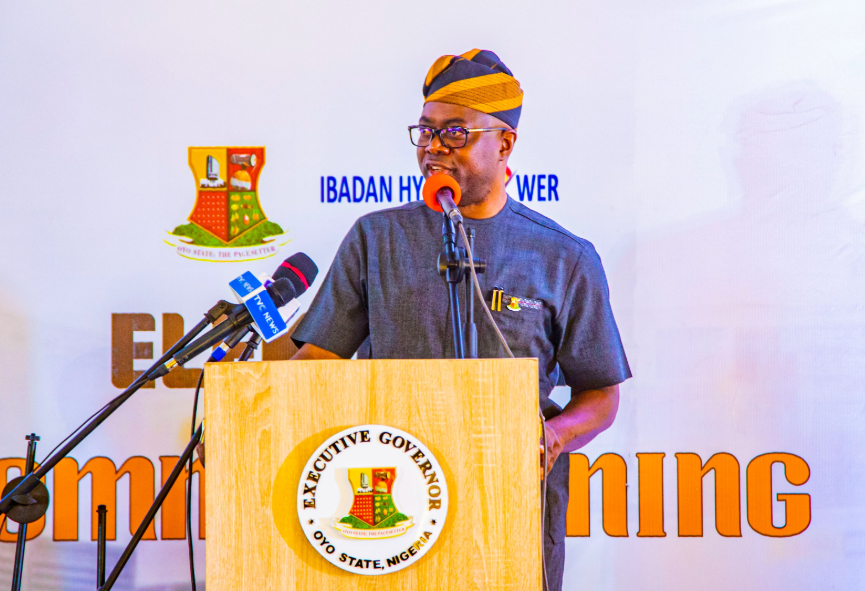
The Oyo State Government has officially received 22,200 units of data tools to enhance healthcare service delivery across the state. The donation, aimed at strengthening family planning and healthcare documentation, was made by the Society for Family Health (SFH) in collaboration with Population Services International (PSI). The handover took place on Monday, February17, in Ibadan, the state capital, with Muideen Olatunji, Executive Secretary of the Oyo State Primary Health Care Board, receiving the items on behalf of the government at the State Secretariat, Agodi. Olatunji, represented by Assistant Director of Planning, Research, and Statistics, Adeyemi Adewole, expressed gratitude to SFH and PSI for their continued support, highlighting the importance of collaborative efforts in addressing the state’s healthcare challenges. He pointed out the pressures posed by a growing population and the ongoing emigration of skilled health professionals, often referred to as the “Japa” syndrome. “Our healthcare challenges require more than just the state and federal government’s efforts. We need to engage in self-care and collaborate with partners who are committed to helping us overcome these obstacles,” Olatunji said. He commended the partnership, stressing that it plays a vital role in the state’s achievements, particularly in the area of family planning. He also reiterated the state’s commitment to improving healthcare service delivery, emphasising that continued support from partners like SFH and PSI was key to Oyo’s success. Fidelis Edet, Business and Strategic Information Manager at DISC-SFH, outlined the components of the donation, which included 15,000 client cards, 5,000 stock cards, 600 monthly summary forms, 600 family planning registers, 500 daily consumption registers, and 500 requisition, issue, and receipt forms. He explained that the donation was part of a larger initiative to support the state’s family planning efforts, following a series of supervisory visits to assess service delivery and data documentation. Solomon Odafe, Technical Project Adviser at PSI, also praised Oyo’s strong performance in family planning service delivery. He noted that the state had successfully aligned its reported data with the tools provided by SFH and PSI, ensuring high-quality services and accurate reporting. The programme, supported by PSI, is currently being implemented in six states, including Oyo. The tools are intended to help healthcare facilities better capture and report data on family planning services, ensuring more efficient tracking and monitoring of healthcare activities in the state.
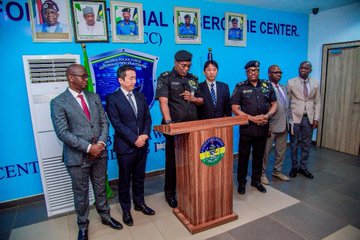
A collaborative operation between the Nigeria Police Force (NPF) and Japan’s National Police Agency has resulted in the arrest of 11 individuals involved in a range of cybercrimes, including identity theft, romance scams, and computer-related fraud targeting Japanese victims. The operation followed a report received on April 3, 2024, detailing multiple cybercrime cases that implicated 13 individuals operating from Nigeria. The suspects were linked to fraudulent activities conducted over social media platforms, primarily Instagram, where they lured victims into fake romantic relationships to exploit them financially. A statement released by the NPF spokesperson, Muyiwa Adejobi, confirmed that the NPF’s National Cybercrime Centre (NCCC), in collaboration with Nigeria’s National Central Bureau (NCB) and NCB Tokyo, launched a comprehensive investigation that led to the arrests. “The Nigeria Police Force, in collaboration with the National Police Agency of Japan, has strengthened efforts to combat cybercrime, This international partnership has proven effective, leading to the apprehension of 11 suspects involved in various forms of cyber-related fraud, including identity theft and romance scams.” Adejobi said in a press briefing. According to Adejobi, the cybercriminals used social media to develop fraudulent relationships with their victims, ultimately convincing them to transfer large sums of money. The funds were then converted into cryptocurrency and funnelled into digital wallets based in Nigeria. “The investigation revealed that victims were deceived into sending money through wire transfers, which was subsequently converted into cryptocurrency. These funds were then directed to digital wallets controlled by the suspects in Nigeria,” Adejobi added. So far, authorities have recovered $33,320 from the arrested suspects, with further efforts underway to trace additional stolen funds. The police are also working to dismantle the entire syndicate responsible for the fraud. “The preliminary investigation has led to the recovery of $33,320. Ongoing efforts are focused on reclaiming additional stolen funds and fully dismantling the network behind these crimes,” Adejobi confirmed. The success of this operation highlights the growing international cooperation in addressing cross-border cybercrime, as the NPF and Japan’s National Police Agency continue to bolster their efforts to combat digital fraud and safeguard victims from increasingly sophisticated online scams.
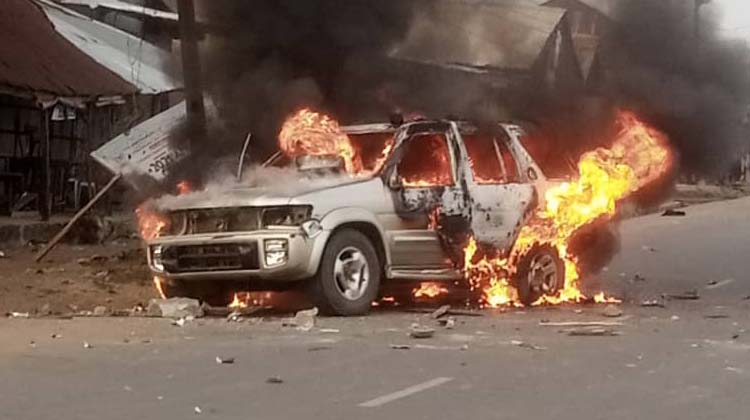
Violence erupted at the Osogbo Central Local Government Area in Oke Baale on Monday, February 17, as members of the Peoples Democratic Party (PDP) and the All Progressives Congress (APC) clashed while attempting to enter the council secretariat. The incident, which involved gunshots and street violence, caused chaos in the vicinity. Eyewitnesses reported hearing gunfire near the entrance to the secretariat, while a bloody altercation between two men, believed to be associated with one of the political factions, was observed. A source close to the scene indicated that one of the men was badly injured. The fight took place in the midst of ongoing gunshots, which sent locals fleeing and left Osogbo/Ibokun Road, which runs past the secretariat, deserted. Armed police officers were quickly deployed to the area, with a visible presence at the entrance to the local government offices. However, the gunmen, identified as suspected political thugs, continued firing sporadically, creating panic among residents. Further incidents unfolded across Osun State, with other local government secretariats also experiencing tensions. READ ALSO: Another communal clash claims four lives in Ondo At the Atakumosa West Local Government Secretariat, a former member of the Osun State House of Assembly, Festus Komolafe, led elected APC members into the premises. However, the group soon left after a brief appearance. Meanwhile, at the Egbedore Local Government Secretariat in Awo, PDP members were seen wielding canes, singing and chanting at the entrance, openly daring APC members to challenge them. Tensions were similarly high in Ayedaade Local Government Area, where APC members arrived at the Gbongan secretariat early in the morning. In another development, APC officials who had been elected during the 15 October 2022 local government elections in Osun State resumed office at the Boripe Local Government Secretariat in Iragbiji without incident. However, attempts by APC members to seize control of the Olorunda Local Government Secretariat in Igbona, Osogbo, were met with strong resistance from PDP supporters. At around 9:20 am, when our correspondent arrived at the Olorunda LGA secretariat, police and security operatives, including officers from the Nigeria Security and Civil Defence Corps and the Amotekun Corps, had established a barricade at the junction leading to the premises. The gate to the secretariat was locked, and no one was permitted to enter. Tensions continued to rise as PDP members, angered by the attempted APC takeover, gathered outside the gates. In a dramatic escalation, two individuals who had been recording the unfolding events from a nearby building were reportedly attacked by thugs, their phones smashed, and the victims assaulted. Some of the assailants were said to be armed with charms, further stoking fear in the area. The situation prompted intervention from Osun State’s Commissioner for Rural Development, Mr. Gani Olaoluwa, who addressed the PDP members gathered at the scene. “We thank you for heeding our call. We won’t allow any illegal takeover here. No court judgement restored them,” Olaoluwa told the crowd, urging calm and promising that the authorities would not permit unlawful actions. Despite the intervention, the situation remains tense, with the security forces maintaining a strong presence across key locations in Osogbo and other parts of Osun State. This series of clashes comes amid ongoing political tensions following the controversial local government elections of 2022. The violence and disruptions have raised concerns over the safety and stability of the region as local political battles continue to unfold.
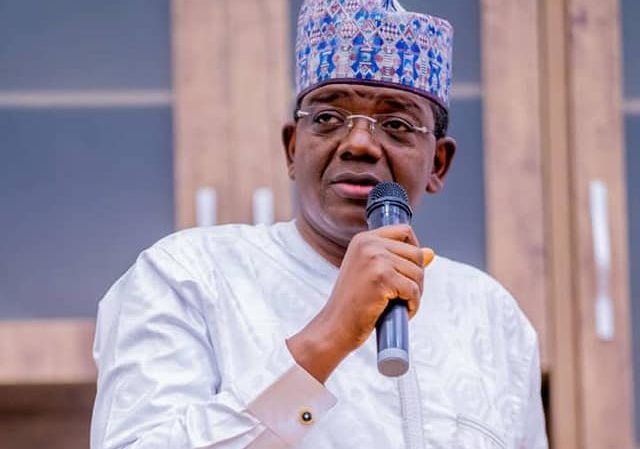
The Minister of State for Defence, Dr. Bello Matawalle, has expressed disapproval over recent comments made by Dr. Babachir Lawal, the former Secretary to the Government of the Federation, regarding President Bola Tinubu’s presidential ambitions for 2027. In a statement released by the Director of Information and Public Relations of the Ministry of Defence, Mr. Henshaw Ogubike, on Monday in Abuja, Matawalle stated that Lawal’s remarks about the president’s re-election bid were misplaced and unfounded. He argued that Tinubu has made significant strides in governance, and that the president would enjoy overwhelming support from the North. Matawalle highlighted that President Tinubu had introduced key reforms across various sectors, including security, the economy, infrastructure, and governance, all of which have positively impacted the nation. He pointed to the president’s successful efforts in improving security in the country, with the security forces neutralising over 8,000 terrorists and bandits, arresting 11,600 criminals, and recovering more than 10,000 weapons in 2024 alone. These actions have significantly improved safety across the Northern region, Matawalle said, adding that the rescue of about 8,000 kidnap victims further underscores the administration’s commitment to securing the nation’s citizens. Additionally, the establishment of the Multi-Agency Anti-Kidnap Fusion Cell (MAAKFC) in collaboration with the UK’s National Crime Agency in December 2024 has strengthened the nation’s capacity to tackle kidnapping. READ ALSO: Northern Nigeria will vote for Tinubu in 2027 elections – Yobe Gov’s Aide From an economic perspective, Matawalle pointed to the creation of the Ministry of Livestock Development, which is focused on tapping into the North’s agricultural potential. He said the initiative aims to boost economic growth and empower millions, particularly women and youth in the region, with a focus on food security. The recent decline in grain prices was also cited as evidence of the effectiveness of the government’s agricultural policies. In terms of infrastructure, Matawalle highlighted several key projects in the North, including road construction and the improvement of transportation networks, which are essential to economic growth. He also commended the decentralisation of power through local government autonomy, which has ensured more effective governance and accountability at the grassroots level. Matawalle made it clear that despite being in office for only 19 months, President Tinubu had already made significant contributions across all regions of Nigeria, including the North, and would continue to enjoy the unwavering support of the people in the region. “The North remains steadfast in its support for President Tinubu, any attempt to suggest otherwise is a deliberate move to sow discord and destabilise our national security. We must assess the tangible benefits of the president’s efforts and support him as he strives for a more prosperous and secure Nigeria.” Matawalle stated. Matawalle concluded by calling on critics to evaluate Tinubu’s record objectively and to unite in their support for the president’s vision for the nation. “Our support for President Tinubu is unwavering and unshakeable, We stand firmly behind his efforts to build a prosperous and secure Nigeria.” he said.

Activist and lawyer Dele Farotimi revealed on Sunday that he is still facing four separate civil suits filed in different states, despite the withdrawal of criminal charges against him. The suits, all stemming from his book ‘Nigeria and its Criminal Justice System,’ were filed by members of the Aare Afe Babalola law office. Farotimi’s revelation came during an interview on the Toyin Falola Interviews, where he discussed the ongoing legal battles he faces following the defamation case initiated by Aare Afe Babalola (SAN) in January. Babalola had accused Farotimi of defaming him in his book, leading to the lawyer’s arrest and subsequent arraignment in Ekiti. READ ALSO: Ooni, monarchs dealbreakers as Afe Babalola withdraws suits against Farotimi However, following the intervention of traditional leaders, including the Ooni of Ife, Babalola announced he would withdraw the case. Although the police withdrew criminal charges against Farotimi, the activist is still confronted with four civil suits related to the book. Farotimi expressed frustration over the ongoing legal proceedings, insisting that his work was a well-researched critique of Nigeria’s judicial system rather than a personal attack on individuals. “I didn’t write the book in a moment of idle talk. I wrote a book, well-researched, documenting the truth of what I saw,” Farotimi said, defending his work as an attempt to bring attention to systemic corruption within the Nigerian legal system. He emphasised that his aim was never to tarnish anyone’s image, particularly not Afe Babalola, but to highlight the broader issues plaguing the judiciary. REAS ALSO: Farotimi breaks down in tears, thanks Nigerians for support Farotimi also dismissed claims that the issue was a personal vendetta, stressing that the real trial is not his reputation but the state of Nigeria’s legal system. “This is not a trial of Dele Farotimi. It’s a trial of the system we’ve built,” he stated. He further criticised those who criticised his book without reading it, calling them “intellectually lazy” and lamenting that Nigerians have become more accustomed to deception than to confronting uncomfortable truths. Farotimi’s ongoing legal struggles reflect the broader challenges of reforming a judicial system he believes is deeply flawed.
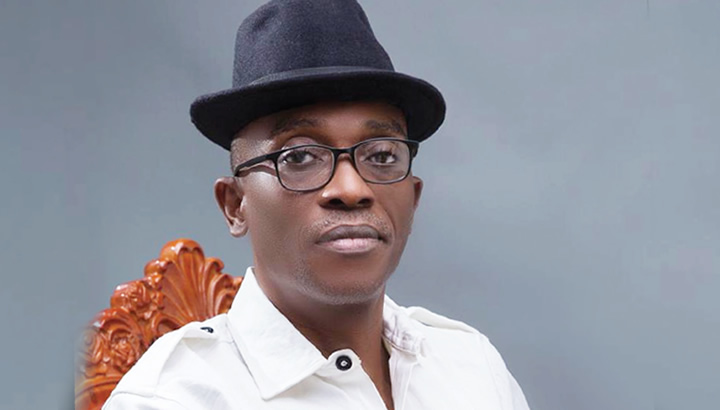
The National Chairman of the Labour Party (LP), Julius Abure, reaffirmed his party’s commitment to the South-East, saying he has no regrets about zoning the presidential ticket to the region ahead of the 2027 election. Abure made this statement during a rally organised by LP members from the South-East, as part of preparations for the Abuja Area Council election next year. Abure praised the unity, industriousness, and fearlessness of the Igbos, particularly following the 2023 general election, when Peter Obi’s candidacy brought national attention to the South-East. “Before the 2023 election, I used to believe erroneously that South-East people were not united. But when Peter Obi joined the party, and I campaigned for him across the country, I discovered that the Igbos are the most united, industrious, hardworking and fearless people,” Abure said. Reflecting on the party’s decision to zone the presidential ticket to the South-East, Abure expressed pride in the move, despite the challenges faced. “That is why today, I have no regrets that despite all odds, we zoned the presidential ticket of our party to the South-East,” he declared. However, he also stressed that the South-East must pursue further alignment with other regions to increase their chances in the 2027 presidential race. “The Igbos need more realignment with other sections of the country. They must be strong, firm, and united with leadership,” Abure said. He reiterated that the Labour Party remains committed to supporting Ndigbo in their quest for the presidency in the future. READ ALSO: 2027: Peter Obi remains our presidential candidate – Labour Party During the rally, Abure also assured party aspirants that the Labour Party would not impose candidates on them, pledging that the upcoming primaries would be free, fair, and credible. “In this coming election, only members of the party will determine who becomes the candidates,” he said, emphasising the importance of respecting the wishes of the party’s base. Abure also addressed broader issues within Nigerian politics, criticising leaders who undermine the will of the people. He warned that the Labour Party, under his leadership, would not condone such practices, which he claimed were responsible for the problems facing political parties in Nigeria. “The reason why Nigeria and other political parties are in trouble is because leaders always want to subvert the wishes and aspirations of the people,” he stated. As the Labour Party prepares for the next election cycle, Abure’s message underscored his commitment to democratic values, unity, and fair representation, all while reaffirming his party’s support for the South-East’s continued political ambitions.
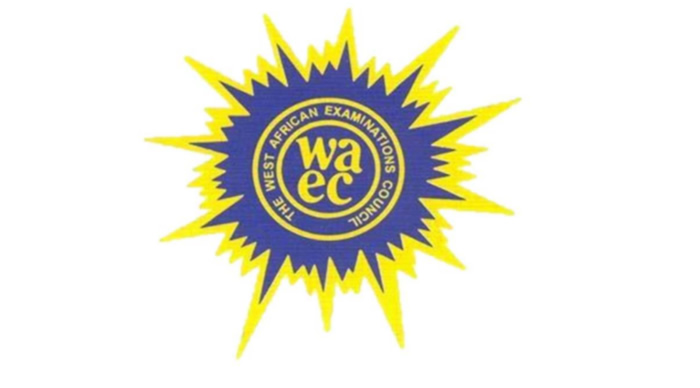
The West African Examinations Council (WAEC) has withheld the results of 2,577 candidates from the 2024 West African Senior School Certificate Examination for Private Candidates (Second Series), due to allegations of examination malpractice. The results were released on Sunday, February 16, with WAEC announcing that the examination had been conducted in two modes for the first time: paper-and-pen and a computer-based hybrid mode. In a statement issued by Moyosola Adesina, the Acting Head of Public Affairs, WAEC confirmed that a total of 68,342 candidates had registered for the examination, though only 65,023 candidates sat for the exam across 5,067 centres nationwide. The council disclosed that 2,577 candidates, representing 3.96% of the total number of candidates, had their results withheld because of various malpractice allegations. WAEC urged the affected candidates to visit the WAEC Notice of Examination Malpractice Portal to make representations regarding the allegations. The statement noted: “All reported cases will be investigated, including exhibits obtained alongside candidates’ representations lodged on the portal. These will be evaluated and reports presented to the appropriate Committee of the Council for determination. The committee’s decision(s) will be communicated directly to the affected candidates.” READ ALSO: Lagos launches ‘Eko Learners’ Support’ for WAEC, NECO candidates WAEC also clarified that 62,354 candidates (95.90%) had their results fully processed and released, while 2,669 candidates (4.10%) had some subjects still being processed due to errors on their part. The council assured that efforts were underway to complete the processing of these results. Regarding the performance of the candidates, WAEC reported that 43,923 candidates (67.55%) obtained credit or above in at least five subjects, while 34,878 candidates (53.64%) obtained credit or above in five subjects, including English Language and Mathematics. This marks a 9.35% improvement in the pass rate compared to the previous years. WAEC expressed its gratitude to government agencies, security personnel, supervisors, invigilators, and examiners who contributed to the successful conduct of the examination. “The results are a testament to their dedication and hard work. We wish all candidates the best in their future endeavours,” Adesina added.





